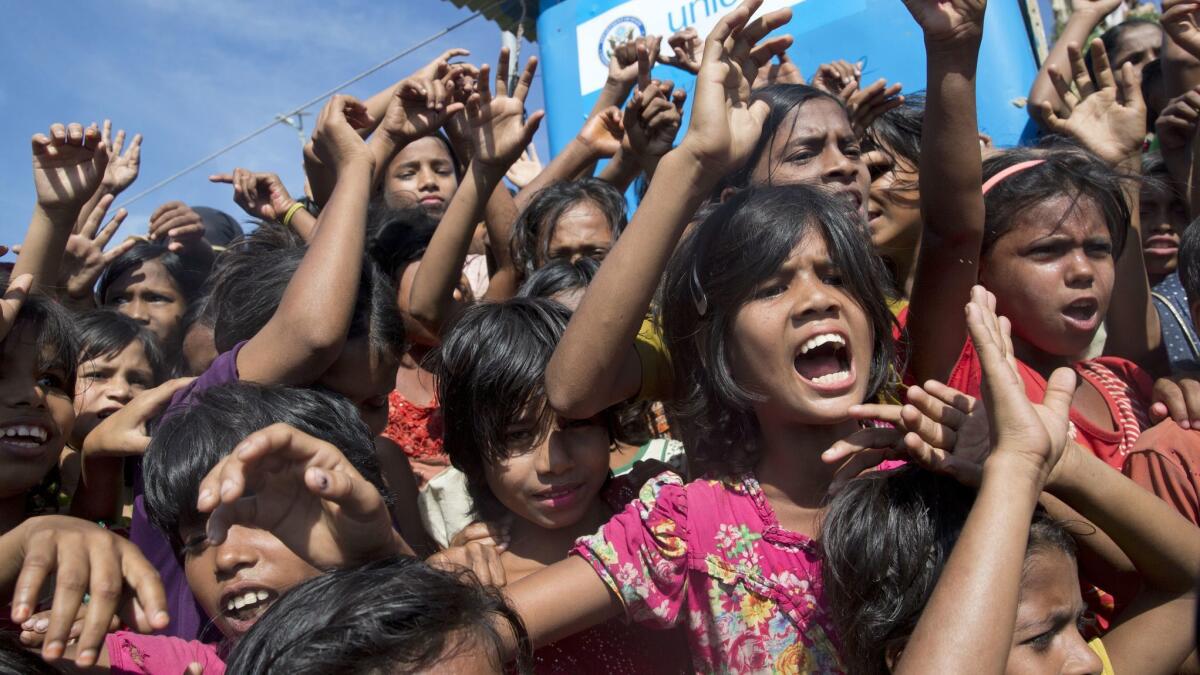Editorial: The Rohingya shouldn’t go back to Myanmar until they can be assured they won’t be killed or raped

The Rohingya Muslims have endured more than a year of savagery at the hands of the Myanmar military, which has burned their villages, killed and raped their people, and driven about 700,000 of them out of the country in what amounts to a campaign of ethnic cleansing. What refuge they could find has been in Bangladesh, in crowded camps near the seaside city of Cox’s Bazar. Eager to move them out, Bangladeshi officials had planned with the Myanmar government to begin repatriating some Rohingya on Thursday, despite the strenuous objections of human rights groups that warned it wouldn’t be safe. Those plans were put on hold when, not surprisingly, officials could find no one who wanted to return to the country where they had just been persecuted and tortured and had their homes destroyed.
The repatriation efforts should not simply be paused; they should be abandoned until the Myanmar government, which has a shameful history of discrimination and violence against the Rohingya, reins in the military and provides for the Rohingya’s safe return to their villages.
And that does not include simply shuffling them from one miserable refugee camp in Bangladesh to another in Myanmar, where thousands of Rohingya already are forced to live in camps. According to reports from observers in Myanmar — also known as Burma — the government has been readying “transit camps” for Rohingya who return from Bangladesh. That’s just wrong. People should be allowed to go back to their villages and housing should be rebuilt for them there. And they need the protection of United Nations or humanitarian-group monitors onsite.
Enter the Fray: First takes on the news of the minute from L.A. Times Opinion »
All this is part of an appalling humanitarian crisis that has long afflicted the stateless Rohingya, who have been denied citizenship in a country with a Buddhist majority population that resents their presence and considers them illegal immigrants. A deadly attack on several Myanmar government security posts by Rohingya rebels in August of 2017 set off the last epic round of violence. But the government’s scorched earth response was orders of magnitude more brutal than the initial violence.
Myanmar leader Aung San Suu Kyi’s continued refusal to condemn the military’s campaign of violence and to safeguard the Rohingya is unconscionable and appalling to all who have revered the Nobel Peace Prize winner. When Vice President Mike Pence told Suu Kyi at a summit of Southeast Asian nations that the violence that drove the Rohingya out of Myanmar was “without excuse,” Suu Kyi gave a bristly response. Amnesty International recently stripped her of its highest award, saying that she no longer was a courageous defender of human rights. She needs to show the world that she remembers how to be one.
Follow the Opinion section on Twitter @latimesopinion or Facebook
More to Read
A cure for the common opinion
Get thought-provoking perspectives with our weekly newsletter.
You may occasionally receive promotional content from the Los Angeles Times.










